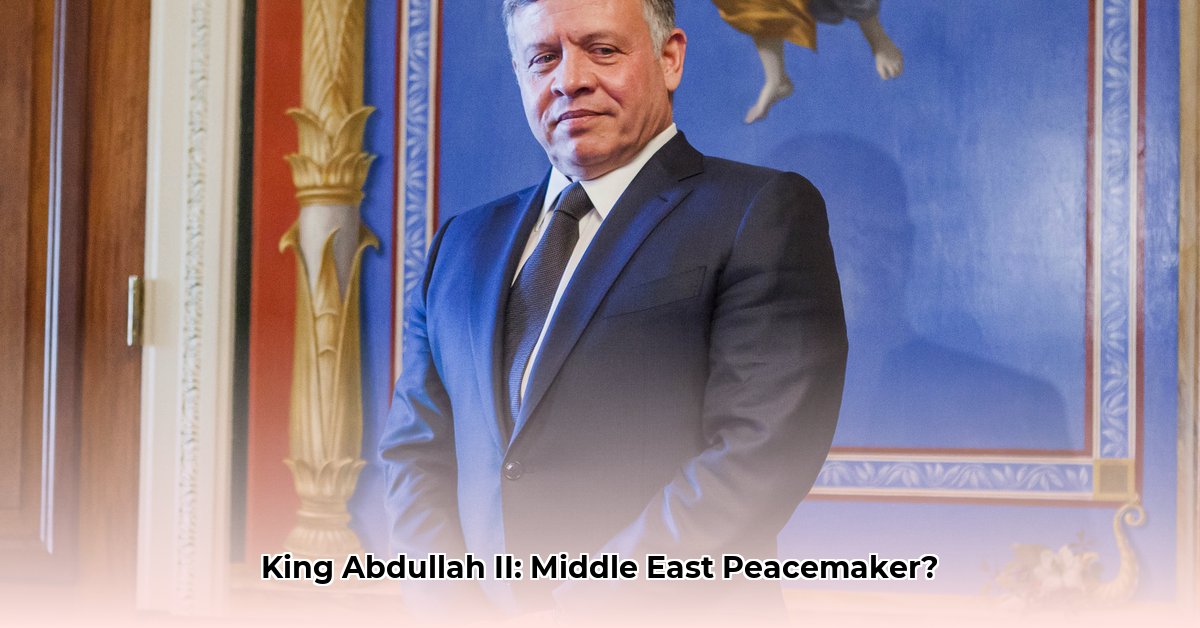
Abdullah II: A King's Balancing Act in the Middle East
King Abdullah II of Jordan’s diplomatic efforts in the Middle East represent a complex interplay of regional and international dynamics. His strategies, aimed at de-escalation and stability, require a delicate balancing act between domestic needs and global concerns. This analysis explores the multifaceted nature of his approach, its potential impact, and the inherent risks involved.
Many Roads to Peace: A Multifaceted Strategy
King Abdullah II employs a diverse range of diplomatic tools. This includes numerous high-level engagements – from telephone conversations with world leaders, including the Greek Prime Minister and the British Prime Minister, to formal meetings and addresses, such as his recent speech to the European Parliament. Beyond bilateral relations, he actively promotes stronger Arab unity, believing collaborative regional efforts are essential for lasting peace. However, how effectively these efforts translate into tangible outcomes requires further examination. Isn't the effectiveness of multilateral diplomacy often difficult to quantify in such a volatile region? The sheer scale of his diplomatic engagements is notable, but concrete achievements need clearer articulation.
Walking a Tightrope: Domestic Needs vs. Global Concerns
Jordan's geopolitical position presents significant challenges. King Abdullah II must simultaneously navigate domestic issues and the complexities of international relations. Maintaining positive relations with key partners, such as the US and the EU, is inherently crucial, necessitating skillful negotiation and a deep understanding of often-conflicting interests. This balancing act demands exceptional diplomatic skill and strategic foresight, particularly given Jordan's limited resources. How does his government successfully allocate resources in the face of competing demands for social welfare, national security, and economic development? The success of his approach hinges on his ability to secure international support to maintain Jordan's domestic stability.
Actions Speak Louder Than Words… But How Loud?
While King Abdullah II's diplomatic activity is readily observable, measuring the actual impact remains a challenge. While his efforts are extensive, quantifying their precise outcomes requires a more in-depth analysis. What specific achievements can be directly attributed to his mediation efforts? The complexity of the Middle Eastern landscape makes isolating the impact of any single actor extremely difficult. Therefore, a more nuanced approach to evaluating his diplomatic success is necessary; focusing solely on the number of meetings is insufficient.
The Big Picture: Short-Term Wins and Long-Term Visions
King Abdullah II appears to be pursuing a dual-track strategy. Short-term goals (within a year) likely focus on maintaining open lines of communication and strengthening Jordan’s economic and security resources. Long-term objectives (3-5 years) aim towards forging stronger regional partnerships and securing new economic opportunities. This strategic duality necessitates both internal resilience and sustained external cooperation. Does this dual approach adequately address the interconnected nature of short-term stability and long-term development in Jordan? The success of this approach requires careful resource allocation and strategic partnerships.
Potential Problems: Risks on the Road to Peace
Several significant risks could undermine King Abdullah II's efforts. The ongoing Israeli-Iranian conflict poses a serious threat, requiring robust international diplomacy. Maintaining domestic stability within Jordan presents another key challenge, demanding substantial progress in economic development and careful management of social issues. Effectively mitigating these risks is paramount to the success of his overall strategy.
| Risk Factor | Likelihood | Impact | Mitigation Strategy |
|---|---|---|---|
| Israeli-Iranian Conflict Escalation | High | Very High | Continuous international diplomacy; strengthening global alliances |
| Internal Unrest in Jordan | Moderate | High | Economic reforms; addressing social concerns; improved security |
| Failure of Regional Cooperation | Moderate | High | Building trust among Arab nations; open and clear communication |
| Foreign Interference in Jordan | Low | Very High | Strengthening national security; developing strong international partnerships |
Legal Minefield: Staying Within the Lines
King Abdullah II’s diplomatic actions generally adhere to international law. However, future actions will require careful consideration of humanitarian law, especially given the ongoing regional conflicts. Transparency and respect for national sovereignty are critical. Domestically, balancing national security with individual rights remains a continuous legal challenge. How does Jordan effectively balance its security concerns with its commitment to human rights and the rule of law? Maintaining this equilibrium is crucial for long-term stability.
How King Abdullah II's diplomacy impacts Jordanian domestic stability
King Abdullah II's diplomatic efforts are intrinsically linked to Jordan's domestic stability. His foreign policy prioritises Jordan's security and economic well-being, using a multi-faceted strategy that strengthens relationships with both global and regional actors. However, the effectiveness of his diplomatic initiatives in improving concrete, measurable indicators of domestic stability remains a key area for further research and analysis. How have specific diplomatic achievements translated into improved economic conditions or reduced social tension? This requires a detailed examination of relevant data.
Key Takeaways:
- King Abdullah II's diplomatic efforts are paramount to Jordan's stability.
- His Majesty's foreign policy centres on Jordan's security and economic prosperity.
- A multi-faceted approach strengthens relationships with global and regional players.
- Balancing competing interests is critical for Jordan's long-term success.
- Evaluating the effectiveness of his diplomacy requires more detailed data analysis.
The ongoing efforts of King Abdullah II represent a significant undertaking amidst the volatile political landscape of the Middle East. His approach warrants continued study and analysis to fully comprehend its long-term impact.